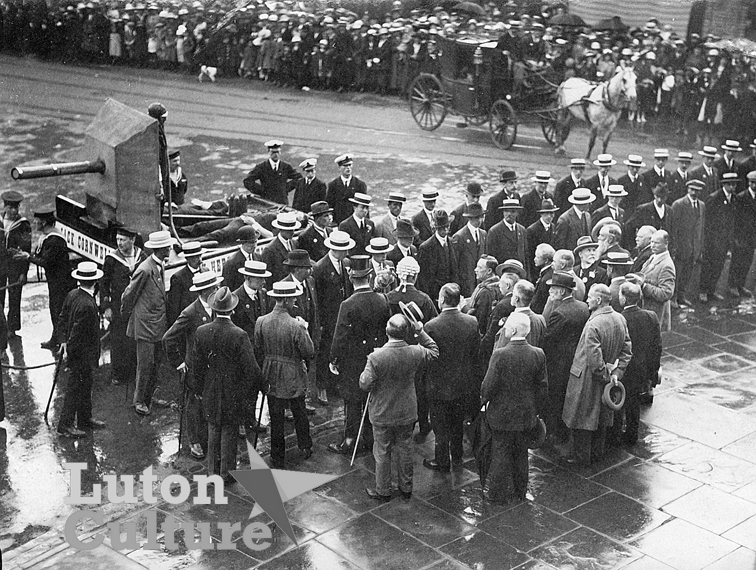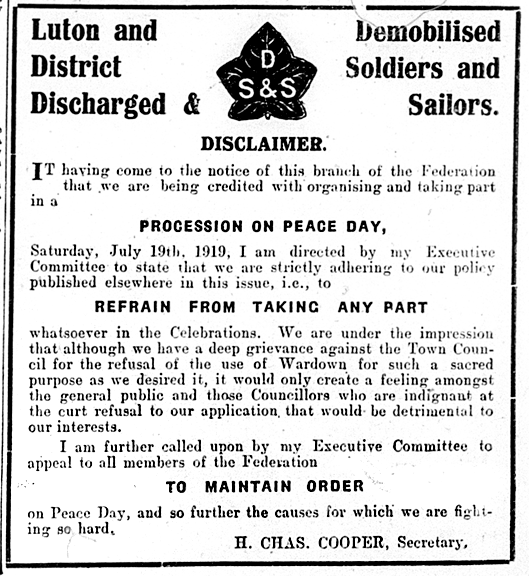
- The earlier appearance of this Comrades of the Great War float outside the rival DS&S club in Park Street had produced the first Peace Day booing, according to the Luton Reporter.
[From The Luton Reporter: Tuesday, July 22nd, 1919]
Tragedy is the only word which will adequately describe Luton's Peace Celebrations – and what a tragedy too! Saturday was a day memorable enough in all conscience. In fact July 19th, 1919, is a date that will be talked of as long as the present generation lasts, and will never fade from the records of local history – but its memorable character was so utterly the reverse of the great day which will live in the memory of folks in other parts of the country that one would it were possible to put back the clock just 24 hours and draw a veil over the regrettable happenings that have had such a disastrous effect on the properties and amenities.
The atmosphere prevailing in the town was a veritable mockery of the word 'peace'. While the nation as a whole was giving itself up to rejoicings, we in Luton were troubled by fears and alarums, and, unhappily, what was rather airily viewed in some quarters as the creation of hyper-sensitive imaginations only too surely realised in a demonstration of ruthless destruction and vicious attacks on the forces of law and order that stand out unique in the district since the times of civil war.
The great bulk of the population had their peace rejoicings, it is true, and enjoyed them in spite of the depressing influences of wet weather, but, while they rejoiced, others harboured feelings of revenge and allowed violent passions to so excite and take possession of their whole being that the town has entered upon an era of peace with half its police force on the sick list, many firemen worn out and nursing serious injuries, and the military in control of a borough left with a ruthlessly ruined and gutted Town Hall as a peace monument that bears some sort of resemblance to the monuments left by the Germans as war relics on the field of France and Flanders.
It is terrible to reflect upon, and so from reflections we will pass on to facts, as far as it is possible to convey an idea of such sensational happenings in cold print.
The orgy of violence first came into evidence immediately after the really imposing and well-represented procession of peace and victory had passed the Town Hall on its way from Luton Hoo Park to Wardown Park. Up to the point of reaching the Town Hall the procession had evoked only one sentiment, that of appreciative admiration.
 The thickly-lined crowds lined on either side of the passage of route were models of orderliness and gave expression to unfeigned enthusiasm in the cheers with which they greeted the various units, the solitary exception being a hostile and rather ill-mannered shout, coupled with some little booing as the members of the Comrades of the Great War organisation passed the rival club [that of the Luton and District Discharged Sailors and Soldiers Association] in Park Street. This attitude towards the procession and those taking part in it was consistently maintained right along to Wardown Park, but at the Town Hall something happened to arouse other feelings among a section of the onlookers.
The thickly-lined crowds lined on either side of the passage of route were models of orderliness and gave expression to unfeigned enthusiasm in the cheers with which they greeted the various units, the solitary exception being a hostile and rather ill-mannered shout, coupled with some little booing as the members of the Comrades of the Great War organisation passed the rival club [that of the Luton and District Discharged Sailors and Soldiers Association] in Park Street. This attitude towards the procession and those taking part in it was consistently maintained right along to Wardown Park, but at the Town Hall something happened to arouse other feelings among a section of the onlookers.
The Mayor and members of the Town Council were waiting in the vestibule of the Town Hall to receive the procession, and as it neared the space in front of the municipal headquarters it was steered round to the left, and turned so as to completely pass the Town Hall front before going into Manchester Street. After the first band and car in the peace procession had passed, the Mayor, in his robes and chain of office, accompanied by the Town Clerk in wig and gown, Mayor's sergeant with the mace, and members of the Council came out of the Town Hall to the edge of the pavement.
The naval contingent with their emblematic naval car depicting the heroic last stand of Jack Cornwell, the boy VC, and the Comrades of the Great War contingent were drawn up in front, and, although it was raining sharply, heads were bared as the Mayor read a Royal proclamation received from the King through the Lord Lieutenant which he announced he was desired to read in the presence of men of the Army and Navy.
The Royal message expressed His Majesty's admiration of the courage and endurance displayed by the sailors, soldiers and airmen of the county during the past five years of war, his gratitude to all the brave men and women of the county for their devoted and patriotic service, his sympathy and that of the Queen with the relatives of the gallant men who have given their lives in their country's cause, and their earnest hope that the sick and wounded may be restored to health.
"I rejoice with you today at the restoration of a peace which I trust will bring to us all unity, contentment and prosperity," concluded the Royal message, and this the Mayor supplemented with a personal word "to you men who have come into the procession today”.
"The procession," he said, "could not be complete without the representatives of the gallant men who have been fighting in the war, and therefore I desire most heartily to welcome you and trust that the outcome of our celebrations of peace will be that peace will be inside and outside of our country for many years to come."
 While the Mayor was speaking, someone on the Upper George Street side of the crowd was haranguing his neighbours in that quarter, and there were snatches of cheering and then a volume of booing. The Red Cross Band came to the rescue with the playing of the National Anthem and after this had been sung the Comrades gave cheers and one of the members of the Council called for three cheers for the disabled men. This had the effect of considerably augmenting the booing, and it continued as the procession passed, but nevertheless the Mayor and members of the Council remained on the pavement edge, and, when the Wardown V.A.D. nurses came along another halt was called and the Mayor also read the proclamation to them.
While the Mayor was speaking, someone on the Upper George Street side of the crowd was haranguing his neighbours in that quarter, and there were snatches of cheering and then a volume of booing. The Red Cross Band came to the rescue with the playing of the National Anthem and after this had been sung the Comrades gave cheers and one of the members of the Council called for three cheers for the disabled men. This had the effect of considerably augmenting the booing, and it continued as the procession passed, but nevertheless the Mayor and members of the Council remained on the pavement edge, and, when the Wardown V.A.D. nurses came along another halt was called and the Mayor also read the proclamation to them.
This time he had a chair brought to him and mounted it in order to be seen and heard. But a large section of the crowd had evidently made up its mind not to allow him to be heard, and he was howled down by a demonstration that was hostile in the extreme.
People in the crowd were saying that this was asking for trouble, and they were not unreliable prophets. As a matter of fact things became so threatening that before the procession had completely passed, the Mayor and his colleagues retreated to the Town Hall steps and then disappeared inside. They were either mental telepathists or their action was inspired by some who had heard something, for directly the last part of the procession had got clear the crowd made a rush for the Town Hall.
Demands were made for speech with the Mayor and Town Clerk but by this time the doors had been bolted and barred, and there was no response to their requests.

